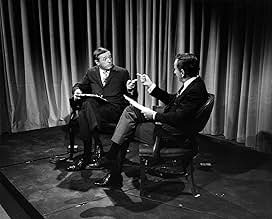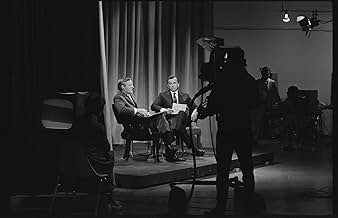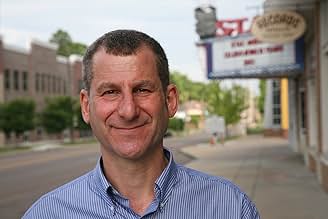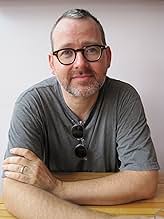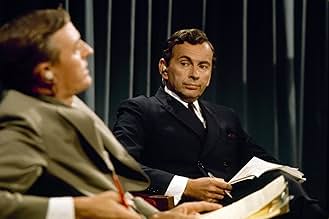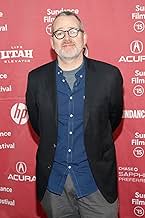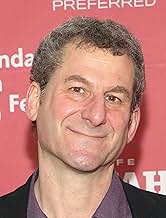CALIFICACIÓN DE IMDb
7.6/10
6.6 k
TU CALIFICACIÓN
Agrega una trama en tu idiomaA documentary on the series of televised debates in 1968 between liberal Gore Vidal and conservative William F. Buckley.A documentary on the series of televised debates in 1968 between liberal Gore Vidal and conservative William F. Buckley.A documentary on the series of televised debates in 1968 between liberal Gore Vidal and conservative William F. Buckley.
- Dirección
- Guionistas
- Elenco
- Premios
- 6 premios ganados y 27 nominaciones en total
Gore Vidal
- Self - Debater
- (material de archivo)
William F. Buckley
- Self - Debater
- (material de archivo)
Noam Chomsky
- Self
- (material de archivo)
Patricia Buckley
- Self - Buckley's Wife
- (material de archivo)
Sam Donaldson
- Self - Correspondent, ABC News
- (material de archivo)
Howard K. Smith
- Self - Anchor, ABC News
- (material de archivo)
- Dirección
- Guionistas
- Todo el elenco y el equipo
- Producción, taquilla y más en IMDbPro
Opiniones destacadas
"Best of Enemies" (2015 release; 88 min.) is a documentary about the infamous 10 televised debates that took place during the 1968 Republican and Democratic Presidential Conventions (in Miami and Chicago, respectively), between conservative William Buckley Jr. and liberal Gore Vidal. As the documentary opens, Vidal is commentating about old pictures hanging up in his house and one of them is showing Buckley and Vidal at one of those debates. We then get some background as to who these 2 guys are, and why ABC veered away to bring the "unconventional Convention" coverage. And then we get to the first debate... To tell you more would spoil your viewing experience, you'll just have to see for yourself how it all plays out.
Couple of comments: this documentary is co-directed by Morgan "20 Feet From Stardom" Neville and Robert Gordon, who is affiliated with the Heritage Foundation, a conservative think-tank. If you think that means the documentary is kinder to Buckley that to Vidal, think again. The two men are pitted against each other, and vehemently disdain each other, even before these debates, and much more so afterwards. "It was a confrontation of life styles", as someone comments. Yes, it was, but as it turns out, these debates had another unexpected consequence: ABC's ratings went through the roof, and the other mainstream networks quickly realized they had to have their own versions of these "point-counterpoint" programs. In other words, the Buckley-Vidal debates set into motion what would eventually become the Fox's and MSNBC's news channels. Apart from the historical legacy created by these debates, the documentary also examines the long shadows cast be the debates over the personal lives of both Vidal and (even more so) Buckley. If you have any interest in politics and/or in TV history, you will not want to miss this documentary. It makes for completing viewing, period.
"Best of Enemies" made quite a splash at the Sundance film festival earlier this year. The movie's been out for months and I didn't think it would reach theaters here in Cincinnati, but then out of the blue t showed up this weekend at my local art-house theater here. I figured this would not be playing very long and went to see it right away, The matinée screening where I saw this at turned into a private screening, as in: I literally was the only person in the theater. A shame, as this is a riveting documentary. If you get the chance to see this, be it in the theater, on VOD or eventually on DVD/Blu-ray, do not mist it! "BEst of Enemies" is HIGHLY RECOMMENDED!
Couple of comments: this documentary is co-directed by Morgan "20 Feet From Stardom" Neville and Robert Gordon, who is affiliated with the Heritage Foundation, a conservative think-tank. If you think that means the documentary is kinder to Buckley that to Vidal, think again. The two men are pitted against each other, and vehemently disdain each other, even before these debates, and much more so afterwards. "It was a confrontation of life styles", as someone comments. Yes, it was, but as it turns out, these debates had another unexpected consequence: ABC's ratings went through the roof, and the other mainstream networks quickly realized they had to have their own versions of these "point-counterpoint" programs. In other words, the Buckley-Vidal debates set into motion what would eventually become the Fox's and MSNBC's news channels. Apart from the historical legacy created by these debates, the documentary also examines the long shadows cast be the debates over the personal lives of both Vidal and (even more so) Buckley. If you have any interest in politics and/or in TV history, you will not want to miss this documentary. It makes for completing viewing, period.
"Best of Enemies" made quite a splash at the Sundance film festival earlier this year. The movie's been out for months and I didn't think it would reach theaters here in Cincinnati, but then out of the blue t showed up this weekend at my local art-house theater here. I figured this would not be playing very long and went to see it right away, The matinée screening where I saw this at turned into a private screening, as in: I literally was the only person in the theater. A shame, as this is a riveting documentary. If you get the chance to see this, be it in the theater, on VOD or eventually on DVD/Blu-ray, do not mist it! "BEst of Enemies" is HIGHLY RECOMMENDED!
Turn back the clocks fifty years and we find the birthplace of today's angry, confrontational news programming. In the late sixties, standard operating procedure for network television reporting was straight, impartial, monotone and almost entirely fact-driven. ABC, at the time a very distant third to perennial front-runners NBC and CBS, gambled on rowdy, opinion-driven segments during their convention coverage and won... or did we all lose?
At the heart of it all we find the conservative intellectual, William F. Buckley, and his opponent / counterpoint, the liberal author Gore Vidal, who embark upon a series of fiery debates: one for each night of their respective parties' conventions. In retrospect, their early arguments seem downright civilized - both are eloquent, engaging, brilliant conversationalists and they make for a fascinating contrast - but as the routine bears on and the speakers' attacks grow more personal, the cordiality of their discourse deteriorates. Finally, after slyly baiting his hooks for several such confrontations, one speaker elicits a jolting moment of unguarded, contemptuous rage from his opponent and, knowing his battle won, smugly settles in to enjoy the moment.
It's difficult to get completely behind either man, really. Each spins a mesmerizing oral web, but they also fall into the trap of continually one-upping each other, and that betrays the spirit of the debate. Personally, I'd love to spend a dinner party with either, but wouldn't want to make a habit of it. Deeply interesting historical material that answers many questions about how we arrived at this era of brash 24-hour opinions and endlessly question-dodging presidential debates.
At the heart of it all we find the conservative intellectual, William F. Buckley, and his opponent / counterpoint, the liberal author Gore Vidal, who embark upon a series of fiery debates: one for each night of their respective parties' conventions. In retrospect, their early arguments seem downright civilized - both are eloquent, engaging, brilliant conversationalists and they make for a fascinating contrast - but as the routine bears on and the speakers' attacks grow more personal, the cordiality of their discourse deteriorates. Finally, after slyly baiting his hooks for several such confrontations, one speaker elicits a jolting moment of unguarded, contemptuous rage from his opponent and, knowing his battle won, smugly settles in to enjoy the moment.
It's difficult to get completely behind either man, really. Each spins a mesmerizing oral web, but they also fall into the trap of continually one-upping each other, and that betrays the spirit of the debate. Personally, I'd love to spend a dinner party with either, but wouldn't want to make a habit of it. Deeply interesting historical material that answers many questions about how we arrived at this era of brash 24-hour opinions and endlessly question-dodging presidential debates.
Gavel-to-gavel coverage of the Republican and Democratic national conventions was still being offered by CBS and NBC in 1968, but ABC, lacking their resources, limited their coverage to a few hours in the evening and highlighted it with a ten-night debate between conservative author and commentator William F. Buckley Jr. and flamboyant liberal novelist and playwright Gore Vidal. These debates are chronicled in the powerful documentary Best of Enemies directed by Robert Gordon ("Johnny Cash's America") and Morgan Neville ("Twenty Feet From Stardom").
In addition to fully restored original broadcast footage, the film includes commentaries from people who knew Buckley and Vidal such as former TV talk show host Dick Cavett, journalist Frank Rich, authors Christopher Hitchens and Andrew Sullivan, Buckley biographer Sam Tanenhaus, Vidal's last magazine editor, Matt Tyrnauer among others, while actors Kelsey Grammar and John Lithgow read passages from the writings of both men.
Though both men had previously run for public office (Vidal for Congress, Buckley for Mayor of New York), their forte was not politics but writing. Buckley was the founder and editor of the influential conservative magazine The National Review, and Vidal was a controversial novelist and playwright whose sexually liberated views were in evidence in his novels "The City and the Pillar" and "Myra Breckinridge." Both men spoke in the accents of Eastern elites, what Neil Buckley, Bill's surviving brother, describes as "patrician, languid accents," yet both were erudite with acid tongues.
To say that Buckley and Vidal did not get along is like saying Bobby Kennedy and James Hoffa were not the best of friends. Vidal knew that Buckley had supported using nuclear weapons against North Vietnam and China, and called him "a bloodthirsty neurotic," while Buckley retorted, "We all know that your tendency is to be feline." The Democratic Convention was held in Chicago where protests against the Vietnam War and the subsequent police overreaction threatened to derail the nominating process, creating a highly-charged atmosphere for the debates that only enhanced the acrimony.
One of the highlights occurred in the ninth of ten debates where the debaters clashed over the extent of the police response against the demonstrators and both stepped out of their well-calculated cool, intellectual personas. The discussion began with the revelation that the police had removed a Viet Cong flag from the demonstration. While Vidal defended the right of the demonstrators to state their political views, Buckley noted that during World War II, people were free to ostracize pro-Nazi spokesman even though they were free to speak their views. Vidal responded by saying that "the only sort of crypto-Nazi I can think of is yourself." Though the moderator Howard K. Smith warned both men against name calling, a red-faced Buckley, his hands trembling, shouted, "Now listen, you queer, stop calling me a crypto-Nazi or I'll sock you in your goddamn face, and you'll stay plastered." It was a moment that Buckley regretted, though the feud continued with competing articles in Esquire Magazine and subsequent law suits. Best of Enemies is provocative and terrific entertainment but while the edited debates are pure theater, full of witty banter and relentless thrusts and parries, they are less than illuminating as a contribution to the troubling issues of the time and include no discussion of the most important issue of the day, the Vietnam War.
Although issues such as economic inequality, foreign involvements, and issues of morality and culture were discussed, the debates were not a conflict over positions on issues as much as they were a battle between two individuals convinced the other was a threat to the health and well-being of the country.
Many commentators in the film are full of nostalgia for the day when intellectuals were seen on television and point to today's cable news pundits screaming at each other (rather than the corporatization of the media and the over-dependence on ratings) as evidence of the decline of American television, but if the Buckley-Vidal debates are an example of the intellectual vitality of television in the sixties, I think I'd rather stick with Rachel Maddow.
In addition to fully restored original broadcast footage, the film includes commentaries from people who knew Buckley and Vidal such as former TV talk show host Dick Cavett, journalist Frank Rich, authors Christopher Hitchens and Andrew Sullivan, Buckley biographer Sam Tanenhaus, Vidal's last magazine editor, Matt Tyrnauer among others, while actors Kelsey Grammar and John Lithgow read passages from the writings of both men.
Though both men had previously run for public office (Vidal for Congress, Buckley for Mayor of New York), their forte was not politics but writing. Buckley was the founder and editor of the influential conservative magazine The National Review, and Vidal was a controversial novelist and playwright whose sexually liberated views were in evidence in his novels "The City and the Pillar" and "Myra Breckinridge." Both men spoke in the accents of Eastern elites, what Neil Buckley, Bill's surviving brother, describes as "patrician, languid accents," yet both were erudite with acid tongues.
To say that Buckley and Vidal did not get along is like saying Bobby Kennedy and James Hoffa were not the best of friends. Vidal knew that Buckley had supported using nuclear weapons against North Vietnam and China, and called him "a bloodthirsty neurotic," while Buckley retorted, "We all know that your tendency is to be feline." The Democratic Convention was held in Chicago where protests against the Vietnam War and the subsequent police overreaction threatened to derail the nominating process, creating a highly-charged atmosphere for the debates that only enhanced the acrimony.
One of the highlights occurred in the ninth of ten debates where the debaters clashed over the extent of the police response against the demonstrators and both stepped out of their well-calculated cool, intellectual personas. The discussion began with the revelation that the police had removed a Viet Cong flag from the demonstration. While Vidal defended the right of the demonstrators to state their political views, Buckley noted that during World War II, people were free to ostracize pro-Nazi spokesman even though they were free to speak their views. Vidal responded by saying that "the only sort of crypto-Nazi I can think of is yourself." Though the moderator Howard K. Smith warned both men against name calling, a red-faced Buckley, his hands trembling, shouted, "Now listen, you queer, stop calling me a crypto-Nazi or I'll sock you in your goddamn face, and you'll stay plastered." It was a moment that Buckley regretted, though the feud continued with competing articles in Esquire Magazine and subsequent law suits. Best of Enemies is provocative and terrific entertainment but while the edited debates are pure theater, full of witty banter and relentless thrusts and parries, they are less than illuminating as a contribution to the troubling issues of the time and include no discussion of the most important issue of the day, the Vietnam War.
Although issues such as economic inequality, foreign involvements, and issues of morality and culture were discussed, the debates were not a conflict over positions on issues as much as they were a battle between two individuals convinced the other was a threat to the health and well-being of the country.
Many commentators in the film are full of nostalgia for the day when intellectuals were seen on television and point to today's cable news pundits screaming at each other (rather than the corporatization of the media and the over-dependence on ratings) as evidence of the decline of American television, but if the Buckley-Vidal debates are an example of the intellectual vitality of television in the sixties, I think I'd rather stick with Rachel Maddow.
The legacy of William F. Buckley, Jr. is not necessarily his 'National Review'; it isn't his devotion to the Buckley pere's hatred of FDR's New Deal, an act deemed a patrician's treachery to his class; it is the implosion of what his brother Reid concretes him as a revolutionary who ushered in the conservative revolution that we see in the impossible array of 17 candidates for the 2016 Republican nomination for the American presidency and the rise of Donald Trump. But, in 'Best of Enemies' trans-political make over is a glint in Buckley's eye as he faced the talented Gore Vidal as they 'commented' on the 1968 Republican convention in Miami and then the Democratic convention in Daley's Chicago. Who has read Buckley's apologia pro sua vita as spy for the FBI 'God and Man at Yale' today? Brilliant, effete, an amateur of the harpsicord,a seasoned sailor, he thought of himself the American heir to the little read GK Chesterton, in his affected speech. He could demolish in high disdain the arguments of his guests on 'Firing Line', guests like Norman Mailer, Allan Ginsberg and the like. Buckley was a man of the right--God, Country, Law and Order, who fought those critics of his values not necessarily in the name of freedom and humanity but in defense of older medieval values by attacking contemporary secular culture. And the embodiment of his distaste was the writer, playwright and commentator on things cultural and political Gore Vidal. ABC pitted these two 'aristocrats' of polished English as a wedge in the wall-to-wall coverage of the conventions by rivals CBS and NBC, at a time nightly television news was accepted more or less straight by the American people. From the get go, it was obvious that these two mavens of the Verb mutually loathed one another. Buckley shucking and sliding verbally, eyes popping, a supercilious grin on his lip as he flung mud at Vidal, not so much on what he said about the convention but for what he stood for. Remember, Gore Vidal had broken taboos for his 'Myra Breckenridge', about a transgendered man, light years ahead of the much admired Caitlin Jenner, a Republican. To Buckley, the writer of note was an enemy of God and patrician values and yes even to an elite education which Gore Vidal didn't pursue--he was a drop out who joined the Army during WW2, serving in Alaska where he wrote his much praised 'Williwaw'. Vidal was a 'revolutionary' in his own way; he published 'The City and the Pillar', which had a homosexual theme, that so exasperated the Old Grey Lady, the New York Times, which boycotted reviewing any of his books till decades later when they couldn't ignore his obvious talent. And in Gore, Buckley met more than his equal, so much so that until his death he wouldn't pronounce the V word. Buckley and Vidal were bellwethers; each had a finger on the rage and discontent of the times. And according to the talking heads, their 10 debates radically changed political discourse that now plagues our own day. 'Best of Enemies' is more than nostalgia, it is a palimpsest for the soul of the American soul. Buckley was an admirer of authoritarianism that Vidal was not. And it was to Vidal's credit that he pierced the supercilious armor of Buckley that, despite the adulation of his peers, rendered a life of hobnobbing with the rich and famous, the anti-Semites and racists, made him lose his 'cool' and restful nights of sleep. Even though he called Vidal a 'queer' (which wasn't a slur a half-century ago), Vidal suspected that he was a closet case, going as far as saying he was an incarnation of Myron Breckenridge. (For those who want to read about the conventions in Miami and bloody Chicago,Norman Mailer's 'Miami and the Siege of Chicago' is not a bad place to begin.
A well-constructed must-see documentary for anyone who is the least bit interested in the politics of journalism. Don't worry that you won't recall/aren't aware of the background. The filmmakers do an excellent job of setting the stage, and an even more impressive job of avoiding the actual political issues in order to focus on the medium. If you want to know how we got where we are, start at the beginning. This is the genesis of punditry and personality-driven journalism. This is not to say that this little slice of evolution is necessarily bad. As the film points out, prior to 1968 the presentation of news was quite static, with little, if any, chance for anything out of the mainstream to make it out of the studio. Now the genie has been loosed from the bottle, and he has truly been feeling his oats for the past several years. It's up to us to rein him in, give him focus, and pray that we can find some common ground before the growing political mitosis reaches the point of no return.
¿Sabías que…?
- TriviaThe film-makers shot an interview with Gore Vidal, but ultimately decided not to use it, so he only appears in archive footage.
- Citas
Richard Wald: ABC was the third of the three networks. It would've been fourth, but there were only three.
- Créditos curiososThere is a short scene after the credits showing footage of an interview with Buckley.
- ConexionesEdited into Independent Lens: Best of Enemies (2016)
Selecciones populares
Inicia sesión para calificar y agrega a la lista de videos para obtener recomendaciones personalizadas
- How long is Best of Enemies: Buckley vs. Vidal?Con tecnología de Alexa
Detalles
- Fecha de lanzamiento
- País de origen
- Sitio oficial
- Idioma
- También se conoce como
- Best of Enemies: Buckley vs. Vidal
- Productoras
- Ver más créditos de la compañía en IMDbPro
Taquilla
- Presupuesto
- USD 1,000,000 (estimado)
- Total en EE. UU. y Canadá
- USD 892,802
- Fin de semana de estreno en EE. UU. y Canadá
- USD 50,378
- 2 ago 2015
- Total a nivel mundial
- USD 892,802
- Tiempo de ejecución
- 1h 27min(87 min)
- Color
Contribuir a esta página
Sugiere una edición o agrega el contenido que falta


